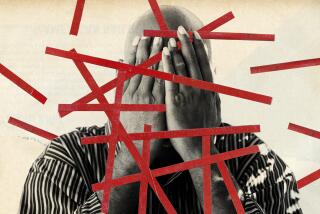Intravenous Feedings Can Be Cut Off, Judge Rules : Ethics: Santa Ana hospital officials must now decide whether to let a comatose woman die. She has been kept alive since 1982.
- Share via
SANTA ANA — A judge’s ruling has cleared the way for officials at an Orange County neurology center to stop intravenous food support for a 51-year-old woman, in a coma for nine years, whose family disagrees on whether she should be allowed to die.
All that’s left to decide now is the best way to go about stopping the feeding--and whether hospital administrators are willing to do it.
“That’s a decision that we haven’t made yet,” said Robert F. Buckley, administrator for the Western Neuro Care Center in Tustin and its residential center in Santa Ana. “It’s an extremely difficult choice to make; I have never been in this position before.”
He said it would be at least a week before any change is made in the care.
The order Friday by Superior Court Judge Tully H. Seymour permits the facility to stop intravenous feeding of Bonnie M. Tomaszewski, who became comatose in 1982 while being anesthetized for a knee operation at a Phoenix hospital.
She was brought to the privately funded, 60-bed Tustin facility in 1984, then two years ago became one of six patients, some of whom are also comatose, at the Santa Ana residential facility.
Buckley said Tomaszewski was moved to the residential facility because daily costs there are half or less what they are at the Tustin hospital.
Although the woman has not been declared brain-dead, she is not capable of conscious thought, and there is no chance of recovery, court records show. She has been kept alive with intravenous introduction of food and water.
“She is in a vegetative state that is permanent,” Buckley said.
The woman’s husband, George Tomaszewski of Scottsdale, Ariz., sought the court order to permit his wife to be taken off intravenous food. But her parents, Robert and Agnes Boyer of Tucson, objected.
The judge followed the recommendation of a court-appointed conservator, Maria Estrada, that the food be cut off.
Western Neuro’s Buckley said both sides of the woman’s family met in recent months for an ethics conference with facility doctors and staff members to discuss the issue of whether to cut off feedings.
“It was a cordial meeting, but there was disagreement within the family what to do,” he said.
Buckley said both sides have agreed not discuss the issue with the news media until later this week.
Tomaszewski’s case is dissimilar to other highly publicized coma cases, such as that of Karen Ann Quinlan, who was kept alive with a mechanical life-support system. Quinlan remained alive for 10 years, despite an end to her mechanical life-support system, because hospital administrators continued to feed her intravenously.
But for Tomaszewski, the end of her food supply means the end of her life. “Death will be imminent if we cut off the intravenous feeding,” Buckley said.
Buckley described Tomaszewski’s physical condition as “excellent” under the circumstances and said there is a bond between the comatose woman and the care facility’s staff members.
“Society’s views on this issue have changed over the years,” Buckley said. “But it’s still a very difficult choice for any health provider. This is probably as hard a thing to do as losing a patient by any other cause.”
If the care center officials agree to do what the court has now permitted, one other decision will be just how to go about halting the feedings.
“Some health care providers believe the proper way is to do it abruptly,” Buckley said. “Others believe it is best to cut off the food supply but to continue to give the patient water, to make sure she is comfortable.”
Tomaszewski’s health care has been paid for with insurance money. Buckley said costs were not an issue in the husband’s decision.
In a statement to the court, her husband said: “I do not believe she would have been content to lie in a hospital bed forever, with no hope of returning to the life she knew.”
But her parents, in their own letter to the court, argued that cutting off food could be “a long, ugly, painful way (for her) to die.”
More to Read
Sign up for Essential California
The most important California stories and recommendations in your inbox every morning.
You may occasionally receive promotional content from the Los Angeles Times.










